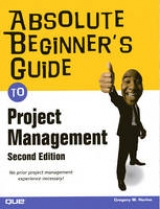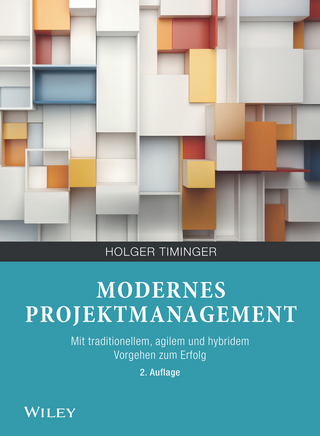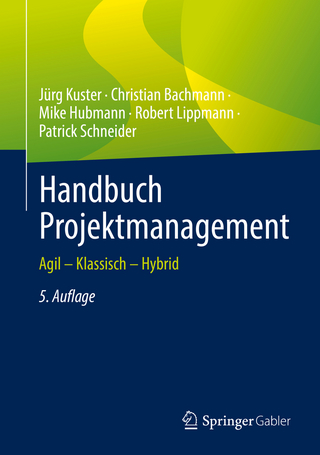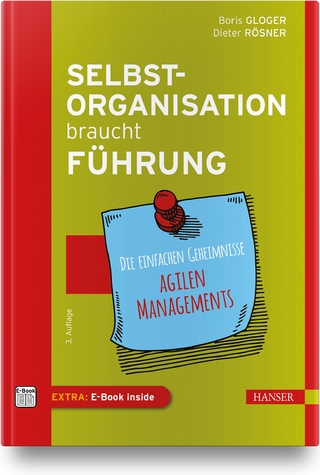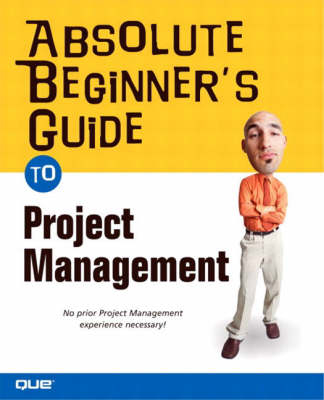
Absolute Beginner's Guide to Project Management
Que Corporation,U.S. (Verlag)
978-0-7897-3197-5 (ISBN)
- Titel erscheint in neuer Auflage
- Artikel merken
A new edition of this title is available, ISBN-10: 078973821X ISBN-13: 9780789738219
You've just been handed your department's biggest project and you probably aren't sure where to even begin. Whether you have 6 months or 6 weeks to complete it, being an effective project manager can make all the difference to the end result. Absolute Beginner's Guide to Project Management can help you quickly become an effective and efficient project manager when time matters most. Through topics such as "building a project budget and schedule" to "managing vendors," this book will guide you through what works and what doesn't based on tried and true practices. Your learning will be focused on the skills and qualities of effective project managers, leadership styles and project trends, including information technology, outsourcing and virtual teams. Let Absolute Beginner's Guide to Project Management help you take your project from start to finish.
Absolute Beginner's Guide to Project ManagementAbout the Author Gregory M. Horine is a published author (PMP Exam Cram 2) and certified project management and business technology professional (PMP, CCP) with more than 16 years of consulting experience across multiple industries. His primary areas of professional expertise include Project management and leadership Complex application development Enterprise solution development Business process analysis and improvement Data analysis and transformation Package implementation and integration Vendor and procurement management Regulatory and process compliance Project management tools Computer systems validation Testing processes Quality and risk management In addition, Mr. Horine holds a master's degree in computer science from Ball State University and a bachelor's degree in both marketing and computer science from Anderson College (Anderson, IN). Through his "servant leadership" approach, Mr. Horine has established a track record of empowering his teammates, improving project communications, overcoming technical and political obstacles, and successfully completing projects that meet the targeted objectives. Mr. Horine is grateful for the guidance and the opportunities that he has received from many mentors throughout his career. Their patience and influence has resulted in a rewarding career that has been marked by continuous learning and improvement. You can access a recent interview of Mr. Horine by the Canadian Information Processing Society (CIPS) and the Networking Professionals Association (NPA) at these respective websites: http://www.npanet.org/public/interviews/careers_interview_121.cfm http://www.stephenibaraki.com/cips/feb04/ghor.asp When not engaged in professional endeavors, Mr. Horine hones his project management skills at home with his lovely wife, Mayme, and his five incredible children: Michael, Victoria, Alex, Luke, and Elayna. © Copyright Pearson Education. All rights reserved.
Introduction.
About This Book.
Who Should Read This Book?
How This Book Is Organized.
Conventions Used in This Book.
I. PROJECT MANAGEMENT JUMPSTART.
1. Project Management Overview.
What Is Project Management...Exactly?
What Is the Value of Project Management?
Why Are Projects Challenging?
Growing Demand for Effective Project Managers?
Trends in Project Management.
2. The Project Manager.
One Title, Many Roles.
Key Skills of Project Managers.
Qualities of Successful Project Managers.
15 Common Mistakes of Project Managers.
3. Essential Elements for Any Successful Project.
What Exactly Is a "Successful" Project?
Learning from Troubled Projects.
Learning from Successful Projects.
Essential Project Manager Toolkit.
II. PROJECT PLANNING.
4. Defining a Project.
Setting the Stage for Success.
How Does Defining a Project Relate to Project Planning?
Project Definition Document.
Project Definition Checklist.
5. Planning a Project.
Key Project Planning Principles.
Important Questions Project Planning Should Answer.
Building a Project Plan.
Summary of Supplemental Project Plan Components.
Project Plan Checklist.
6. Developing the Work Breakdown Structure.
What Is a WBS Exactly?
Why Is the WBS Important?
The Process of Building a WBS.
7. Estimating the Work.
Next Step in the Schedule Development Process.
Managing the Risk, Managing the Estimates.
Reasons for Estimating Woes.
Powerful Estimating Techniques and Methods.
Best Practices.
8. Developing the Project Schedule.
The Impact of the Project Schedule.
The Goal of the Schedule Development Process.
Key Inputs for Building a Schedule.
Creating a Schedule.
9. Determining the Project Budget.
The Impact of the Project Budget.
Principles of an Effective Budget.
Creating a Project Budget.
Common Budget Challenges.
III. PROJECT CONTROL.
10. Controlling a Project.
What Is Project Control?
Management Fundamentals for Project Control.
Powerful Techniques for Project Control.
Performance Reporting.
Variance Responses.
Leveraging Earned Value Management Concepts.
Common Project Control Challenges.
Lessons from Project Recoveries.
11. Managing Project Changes.
What Exactly Is a Project Change and What's the Big Deal Anyway?
Fundamentals for Managing Project Change.
What Causes Unplanned Scope Changes?
Essential Elements of a Project Change Control System.
Powerful Techniques for Minimizing Project Changes.
Common Project Change Control Challenges.
12. Managing Project Deliverables.
"Managing Project Deliverables" Means What Exactly?
Why Do This? It's Too Much Work.
Identify, Protect, and Track: The Principles of Managing Work Products.
Best Practices.
Configuration Management Plan.
Common Challenges and Pitfalls.
13. Managing Project Issues.
The Goals, Objectives, and Principles of Project Issue Management.
Key Features of Issue Management System.
Options for Issue Log.
Best Practices.
Some Special Situations.
14. Managing Project Risks.
Key Risk Management Principles.
The Essential Process for Managing Project Risks.
The Common Sources of Project Risk.
Typical Problems.
Powerful Risk Control Strategies.
Are You Sure It's a Risk?
15. Managing Project Quality.
What Is "Project Quality"?
Unique Aspects of Managing Project Quality.
Principles of Managing Project Quality.
Powerful Tools and Techniques for Project Quality.
Powerful Quality Strategies.
Typical Quality-Related Challenges.
IV. PROJECT EXECUTION.
16. Leading a Project.
More Than Managing.
Where Is Leadership Needed on a Project?
Twelve Keys to Better Project Leadership.
Power of Servant Leadership Approach.
17. Managing Project Communications.
What Are Project Communications?
The Importance of Project Communications.
Why Communicating Can Be Tough.
Seven Powerful Principles.
Best Practices of Effective Project Communicators.
18. Managing Expectations.
Value of Reviewing Stakeholder Expectation Management.
Critical Aspects of Expectations.
Seven Master Principles of Expectation Management.
Essential Elements of Managing Expectations.
19. Keys to Better Project Team Performance.
High-Performing Teams.
Ten Key Principles.
Proven Techniques.
Special Situations.
20. Managing Differences.
Five Key Principles.
Proven Techniques for Leading Cross-Functional Projects.
Proven Techniques for Leading Cross-Cultural Projects.
Proven Techniques for Leading Virtual Projects.
21. Managing Vendors.
First, Let's Clarify a Few Terms.
Ten Proven Principles of Vendor Management.
Twelve Tips for Buyers.
Seven Tips for Sellers.
Twelve Key Project Management Skills for Better Vendor Management.
Stuff You Need to Know About Contracts.
22. Ending a Project.
Three Key Principles.
Project End Checklist-13 Important Steps.
Common Project Closing Challenges.
Methods for Ending a Contract or a Project.
Index.
| Erscheint lt. Verlag | 19.5.2005 |
|---|---|
| Sprache | englisch |
| Maße | 188 x 232 mm |
| Gewicht | 564 g |
| Themenwelt | Wirtschaft ► Betriebswirtschaft / Management ► Projektmanagement |
| ISBN-10 | 0-7897-3197-5 / 0789731975 |
| ISBN-13 | 978-0-7897-3197-5 / 9780789731975 |
| Zustand | Neuware |
| Informationen gemäß Produktsicherheitsverordnung (GPSR) | |
| Haben Sie eine Frage zum Produkt? |
aus dem Bereich
